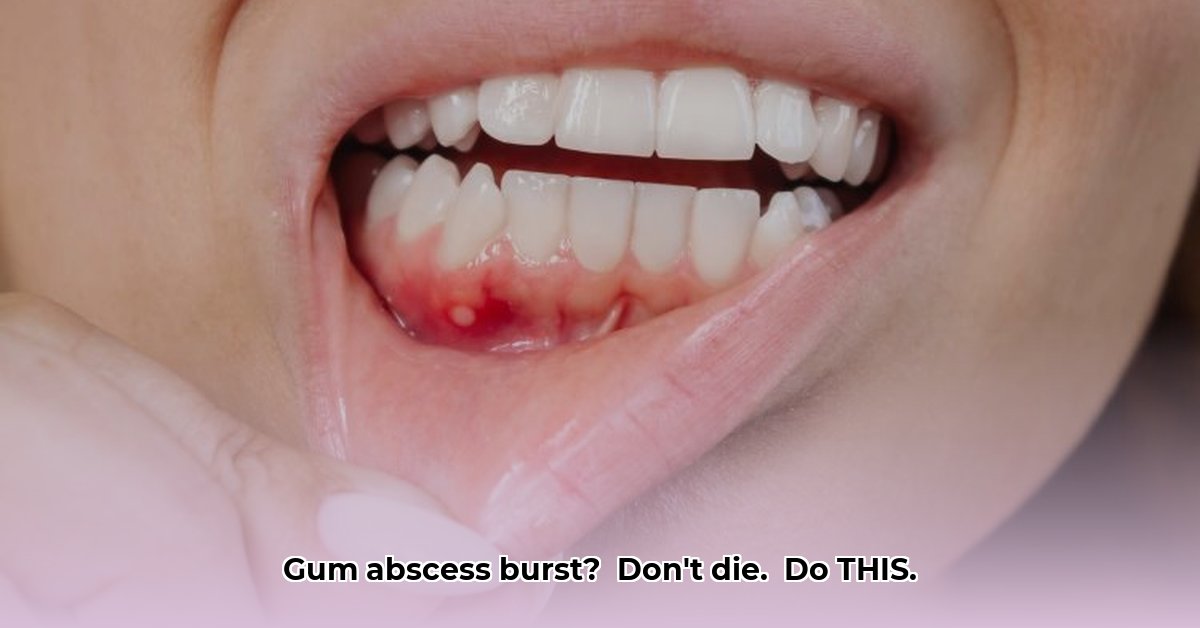The Dangers of a Gum Abscess: Understanding the Risks
Got a throbbing, pus-filled bump on your gums? It’s likely a gum abscess, and while it might be tempting to squeeze it, don’t! While unlikely to be instantly fatal, popping a gum abscess can worsen the situation. This guide explains why, and outlines what you should do instead.
Debunking the Myth: Can Popping a Gum Abscess Be Fatal?
The short answer is: probably not directly. However, ignoring the underlying infection that caused the abscess can lead to serious, even life-threatening complications. The real danger isn’t the abscess itself, but the potential for the infection to spread.
The Risks of an Untreated Infection
A gum abscess (also known as a periodontal or periapical abscess, depending on its location) is a pocket of pus caused by a bacterial infection. Left untreated, this infection can spread from your gums to your jawbone, then to your face, neck, and potentially even vital organs. While rare, serious complications like Ludwig’s angina (a severe infection under the tongue), cavernous sinus thrombosis (a blood clot at the base of the brain), and sepsis (a life-threatening body-wide reaction to infection) can occur.
Why DIY Drainage Is Dangerous
Squeezing a gum abscess can push bacteria deeper into the tissues, potentially delaying healing and leading to further complications. You also risk introducing new bacteria, creating a more severe infection. Furthermore, self-treatment may mask symptoms, making diagnosis and treatment by a dentist more difficult.
What If It Bursts on Its Own?
A spontaneous rupture might provide temporary pain relief, but the underlying infection remains. It’s crucial to see a dentist to completely eradicate the infection and address the root cause.
Getting Professional Help: The Right Way to Treat a Gum Abscess
Seeing a dentist is the only safe and effective way to treat a gum abscess. They have the expertise and tools to properly diagnose and treat the infection. Depending on the severity and location, treatment may involve:
- Draining the abscess: Your dentist will create a small incision to release the pus and relieve pressure.
- Antibiotics: These medications help combat the bacterial infection, although research suggests that in some cases, they might not be necessary. Your dentist will determine the appropriate course of action.
- Root canal: If the infection originates from inside the tooth, a root canal may be necessary to remove the infected pulp and save the tooth.
- Tooth extraction: In severe cases, if the tooth is too damaged, extraction may be the best option.
- Deep cleaning (scaling and root planing): This procedure removes plaque and tartar buildup below the gum line, helping to prevent future infections.
Managing Discomfort Before Your Appointment
While waiting for your dental appointment, you can take steps to ease discomfort:
- Rinse with warm salt water: This can help soothe the area and may promote drainage.
- Over-the-counter pain relievers: Ibuprofen or acetaminophen can reduce pain and swelling.
- Cold compress: Applying a cold compress to your cheek can also help reduce inflammation.
Important: These are temporary measures for comfort only and do not treat the infection.
Preventing Gum Abscesses: A Step-by-Step Guide to Optimal Oral Hygiene
Preventing gum abscesses starts with a consistent oral hygiene routine:
- Brushing: Brush twice daily for two minutes with fluoride toothpaste, covering all tooth surfaces.
- Flossing: Floss daily to remove food particles and plaque from between teeth and under the gum line.
- Rinsing: Use an antimicrobial mouthwash after brushing and flossing to further reduce bacteria.
- Healthy Diet: Limit sugary foods and drinks, as sugar fuels bacteria growth.
- Regular Dental Visits: Schedule checkups and cleanings every six months, or as recommended by your dentist.
When to Seek Emergency Care
Certain symptoms warrant immediate medical attention:
- Difficulty breathing or swallowing
- Significant facial or neck swelling
- High fever
- Severe pain
- Rapid heart rate
- Confusion
- Severe headache accompanying the abscess
These could indicate a spreading infection requiring urgent care.
Finding a Dentist Quickly
If you suspect a gum abscess, finding a dentist promptly is crucial. Here’s how:
- Online search: Use terms like “emergency dentist near me” or “dentist specializing in gum abscesses.”
- Online directories: The American Dental Association (ADA) website offers a “Find a Dentist” tool.
- Personal recommendations: Ask friends, family, or colleagues for referrals.
- Insurance provider: Contact your insurance company for a list of in-network dentists.
- Urgent care clinics: Some urgent care facilities may have dentists or offer referrals.
Remember: When scheduling, mention your suspected gum abscess to convey the urgency.
Your oral health is vital to your overall well-being. Don’t underestimate the potential seriousness of a gum abscess. Seek professional dental care promptly to ensure proper diagnosis and treatment. While current research continues to explore the complexities of gum abscesses and their treatment, the importance of professional dental care remains undisputed.
- Food Making Kits Bring Easy, Fun Homemade Dishes to Your Kitchen - February 5, 2026
- Cooking Kits Make Mastering New Recipes Fun for Everyone - February 4, 2026
- Leak-Proof Glass Food Containers with Locking Lids Keep Food Fresh - February 3, 2026










